| Reviews & Columns |
|
Reviews DVD TV on DVD Blu-ray 4K UHD International DVDs In Theaters Reviews by Studio Video Games Features Collector Series DVDs Easter Egg Database Interviews DVD Talk Radio Feature Articles Columns Anime Talk DVD Savant Horror DVDs The M.O.D. Squad Art House HD Talk Silent DVD
|
DVD Talk Forum |
|
|
| Resources |
|
DVD Price Search Customer Service #'s RCE Info Links |
|
Columns
|
|
|
Berlin Alexanderplatz - Criterion Collection
THE MOVIE:
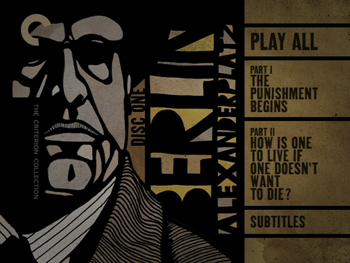
In the documentary Z Channel: A Magnificent Obsession, which in some ways serves as a kind of alternative text book for adventurous cinephiles looking for a resource for finding important lost films, a commentator describes Berlin Alexanderplatz as a large meal. It's hard to come up with something better than that. Rainer Werner Fassbinder's 15-plus hour epic is a lot to digest, a banquet of a movie that one begins devouring when the hours are young and is not done feasting upon until the day grows short.
Originally shown on German television in 1980 in fourteen parts (thirteen main chapters of about an hour each and a somewhat disjointed, two-hour epilogue), this sprawling adaptation of the 1929 novel by Alfred Döblin is a long-unseen curio of cinema history. Outside of its airing on the Z Channel and I believe some outings on public television, it hasn't been shown much in the United States except for a few theatres that programmed it as an event lasting several nights. A video store near me has a bootleg copy on VHS, but apparently only two customers have ever completed the entire thing--which is likely due to the quality of the bootleg more than it is the quality of the project.
Because make no mistake, Berlin Alexanderplatz is a fierce triumph. By the end of the first DVD (Criterion has put the entire show on six discs, with a seventh for supplements) and the first two episodes, after approximately two-and-a-half hours of the feast, I had consumed more than offered in most single-serving movies, and yet I was only just getting started. I was eager to sample the next course.
The story opens in the mid-1920s. Franz Biberkopf (Günter Lamprecht), a WWI veteran and former pimp, is being releases from prison after serving a four-year sentence for accidentally murdering his prostitute girlfriend in a fit of rage. He's a portly, imposing figure, yet life beyond the prison gates appears loud and scary compared to the isolation of his sentence. Though the guard tries to comfort him and tell him that it hasn't been so long, that the world is ready to accept another lost soul like him, this reassurance hides a dark portent: he says that times are bad for everyone. Things aren't going to be as easy as Franz might hope, the world hasn't sat still waiting for him. (As if that wasn't enough of a warning, Fassbinder titles his first chapter "The Punishment Begins." Thank goodness that's not a warning for the viewer, as well!)
There are going to be many strange waters for Franz to navigate, not the least of which is troubles within his own soul. He is paranoid about how regular citizens perceive him, an anxiety only reinforced by the strict rules he must follow as a convict. He's also developed a touch of obsessive-compulsive disorder and gets caught on certain phrases, repeating them an undetermined amount of times before he can finally move on.
This makes Franz a man ripe to be exploited by the social turmoil that is about to erupt in Germany. Though he may wish to live a normal life on the straight and narrow, earning a living and loving his new girlfriend, Lina (Eisabeth Trissenaar)--herself an unbalanced, mercurial creature--there wouldn't be much of a narrative to be had if this were something easily achievable. In pretty short order, he finds that this is not as easy a task as it would seem, every conceivable job has either a personal pitfall or a political snag. Selling one particular newspaper, for instance, puts him in league with the Nazis and at odds with the Bolsheviks. Though he professes to have no real allegiance to any one movement, he has almost convulsive political outbursts that reveal there is more beneath the surface than he is letting show.
Really, Berlin Alexanderplatz could be subtitled "The Education of Franz Biberkopf." He is a scattered man, easily influenced by others. His ever-changing station is subject to whatever theory he has most recently concocted about the human animal and that unpredictable animal's disproving of said theory. His first instinct is to put his trust in the honor of others and the right of the individual to forge his own way, but a personal betrayal shakes his belief in the fundamental goodness of man. This leads to a semi-religious exile and one of the early highlights of Berlin Alexanderplatz. Episode 4, "A Handful of People in the Depths of Silence," has parallels to Jesus' final temptations during his fast in the desert and the trials of Job. Franz has to push through his cynicism and restore his faith in order to pull himself out of this particular pit of despair. If only he had it as easy as Job, though, because the tests Franz will face are far from over.
His new philosophy when he returns to Berlin proper is that people are strange, and one can only shrug at the strange things they do. He becomes a newspaper seller again, sticking to his commitment to be a good man. His big problem, though, is that the bar that serves as his second home and the friends he keeps are still part of the criminal underworld he has sworn to leave behind. This makes it hard for Franz to stay out of trouble. He has a dream at the start of Episode 6 where he is an innocent sparrow and one of his newest friends, Reinhold (Gottfried John), is a snake that lashes out and bites him when he least expects it. More fitting would have been a dream about Reinhold as a weasel, since John looks like one of the rodents out of Disney's Wind in the Willows. The actor creates one of the slimiest, most scummy screen villains to ever cross in front of the camera. Stuttering through his oily speeches, his stammer keeping time with his twitchy eyebrow, his face always betrays the false sincerity of his voice.
Reinhold starts up a particularly despicable pattern with Franz. Every time that the snake gets tired of his latest girlfriend, he passes it to the bird, and the bird passes the previous girl on to someone else, just like the pair of galoshes and other articles of clothing Reinhold uses as his pretense for sending the ladies to Franz's apartment. Women are an inconstant in Franz's life. Only one ever sticks around for long, his original prostitute, the woman he ditched when he took up with the one he ended up killing all those years ago. Eva (Hanna Schygulla) has a new pimp, but her devotion is to her first, to Franz. She appears at regular intervals, a rescuing angel.
Another constant is Franz's old cohort in crime, the always ready and capable Meck (Franz Buchrieser). Meck is the guy you can count on in any situation, who always has the angle, but he can't understand why Franz makes it so hard on himself. He and Reinhold both try to get Franz to rejoin the criminal element. They are in a gang run by Pums (Ivan Desny), a syndicate boss masquerading as a businessman. Pums would be more than happy to have Franz in the gang, and when the guys run a con on Franz, tricking him into betraying his own oath, Franz is forced to change his view of humanity once again.
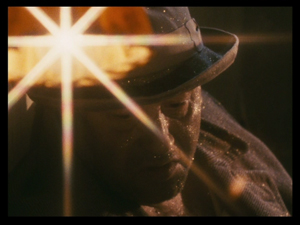
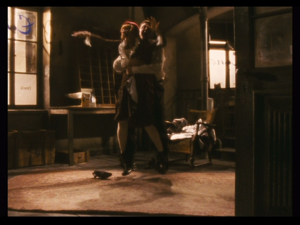
The life-altering heist in Episode 6, "Love Has Its Price," causes changes in Franz that he won't be able to forget easily. As he emerges from his convalescence in Episode 7, he realizes that what all of these betrayals keep telling him is that he must stand alone, and if the straight-and-narrow is not truly open to him, he will dip his toe back into the darkside. He starts fencing for a newer, slicker operator, a shiftless dandy named Willy (Fritz Schediwy) and lets Eva send him a new girl, a young thing whom he playfully dubs Mieze (Barbara Sukowa). By concerning himself only with what he needs and letting the outside world drift--he even puts his friendship with Meck to rest--Franz finds a new contentedness. It is perhaps best exemplified by the alleyway he passes through daily, a carnal side street where perverts can chase their sickest desires in a carnival atmosphere. Franz listens to the barker's well-practiced sales pitch, ripped straight out of the Book of Revelations, and though he recognizes the artistry in it, he also knows that it's only a false front. Things are never as good as they seem, and knowing that keeps him from sliding into its vice-like grip (pun intended).
Ironically, though, this newfound contentedness is the beginning for the end for Franz. He surrenders his emotions to Mieze, and eventually starts letting others dictate what he should do, letting that self-sufficiency slide by the wayside with his oath to do good. They take his last remaining vices from him, leaving him only his thoughts. The past is always with him, shown to us in the oft-repeated scenes of the murder of Ida and images of life in prison. No matter how far forward he goes, these are his defining moments, and their constant presence makes the present a whole new kind of prison for Franz.
For Franz, it's a regression. If the first half of Berlin Alexanderplatz was his education, the second half is the man forgetting all that he learned. Once he stops searching for an answer to life's questions, he falls back into old habits, tumbling into his own history and its unavoidable repetition. His final trial is going to be to face himself, to answer for all he has done and, possibly worse, what he has allowed (and even enabled) to be done.
Fassbinder shot his movie like a conventional narrative. There are certain dreamlike qualities to it, such as the sparkle of light that bounces off of an actor's eye or their smiling teeth. Common lamps hang above the heads of people like guiding stars, and the air becomes alive with glitter and sparkle. There are also scenes where the performers freeze so the camera can get a 360-degree view of them or when the actors circle objects themselves, pacing the scenery as if this were a stage production. Yet, the bulk of the movie is gritty and real. You can almost feel the dust and the grime of city life between your fingers and smell the stale beer and sweat. Where Fassbinder indulges a more fanciful side is in keeping an omniscient eye that watches over the story, like an all-knowing author of a roving narrative. This first manifests as an outside speaker dryly informing us of the situation and happenings in the world tangential to what we are seeing. The director also allows his characters' interior monologues to be heard, coming out at times of distress or indecision. Sometimes more than one character's thoughts erupt at the same time, overlapping in a tango of panic and rushed emotion. This makes Berlin Alexanderplatz the cinematic equivalent of the kind of juicy European novel upon which it is based. Rather than being driven by one character or central circumstance, it embraces the full panoply of the human drama it portrays.
A notable tool at Fassbinder's command is the music of Peer Raben. The director and the composer lay music over the images carefully. In some of the early episodes, the score is spare and barely noticeable. In later episodes, it gets more elaborate and often runs uninterrupted through a scene. When Franz must confront one of his lovers, Cilly (Annemarie Düringer), not wanting to be underhanded with her when Reinhold is looking to trade partners again, Raben plays a repetitious, cascading line on piano, creating an inescapable tension in the scene that reinforces the connection between the two characters--a connection they cannot break as long as the music plays.
It's kind of funny what a gargantuan image Berlin Alexanderplatz has. People view it as a huge undertaking. Having now gone through the whole cycle over a course of a few nights, I don't think anyone should find it daunting. Perhaps the problem is in its regularly being cast as one large movie, which challenges our social conditioning that says a movie is supposed to be under a certain length. Yes, Berlin Alexanderplatz is one complete narrative, it is that scrumptious banquet I compared it to at the outset of this review. Yet, it is no larger in size than your average season of a complicated HBO series like The Sopranos or The Wire. Really, since Berlin Alexanderplatz was originally made for television, it is the prototype for the modern cable drama. Though the show is presented in individual, hour-long episodes that stand on their own as complete stories, they are also part of one overarching narrative. Each segment pushes the bigger story forward while still satisfying unto itself. (Other parallels to The Sopranos include Günter Lamprecht's physical resemblance to James Gandolfini and the extended dreamscape of the final episode, which is the one element of Berlin Alexanderplatz that challenges the mental endurance of the individual viewer.)
Just as with a gripping season of a TV series or an involving novel, Berlin Alexanderplatz is an addictive experience. Once you are in it, you don't want to stop going, and time passes as if it isn't even there. It's really a shame that this masterpiece, a crowning achievement of Rainer Werner Fassbinder's over-achieving career, has been out of circulation for so long. This new Criterion boxed set is another reason we are fortunate to be living in the age of DVD. Week after week, the new release slate puts more and more previously unattainable cinematic gems within our reach. It was thrilling to finally see Berlin Alexanderplatz, and having been satisfied by its particular flavors once, it's going to be a recipe I'll want to serve up again and again.
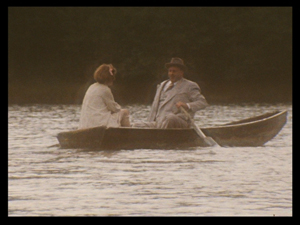
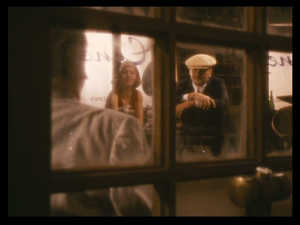
THE DVD
Video:
Since it was originally made for German television, Berlin Alexanderplatz was shot in full frame and has been transferred to DVD at a 1.33:1 aspect ratio. The transfer here is taken from the mammoth 2006 restoration job done by the Fassbinder Foundation and Bavaria Media, and it was supervised by Fassbinder's d.p., Xaver Schwarzenberger. There has been some controversy regarding the color choices the restoration team made, and Schwarzenberger has defended those choices publicly with the unimpeachable explanation that only he and Fassbinder knew what they originally intended, and that's what this version is meant to represent. (Fassbinder died in 1982, two years after the completion of Berlin Alexanderplatz.)
There has also been some issues with the transfer process and the differences between North American and European systems. The Criterion blog detailed choices that had to be made regarding film speed and the effects different processes had. I must say, from what I can tell, they were extremely conscientious and made some very good decisions, because the picture quality is very good and quite vivid at times. There are some inconsistencies and some scenes are grainier than others, but it looks to me like that is just the nature of the production and not actually a DVD transfer problem. The differences in the varying scenes are obvious, and usually the grainy elements are middle or long-distance shots. They almost appear to be from different source materials than the sharp close-ups that are cut into them. In fact, if I understand correctly from the supplemental features, pieces of certain scenes were shot against backdrops of previously used sets to allow the production to shave some days off of location shooting, and that could very well be where these inconsistencies come from.
You may also notice some softer resolution and fuzzy edges here and there, which are glitches that can likely be lain at Criterion's feet, but it's such a minor thing and so rare in this epic undertaking that I don't see getting all bent out of shape about it. For a sprawling television miniseries nearly three decades old, Berlin Alexanderplatz looks damn good on DVD. I say kudos to all involved.
As with most recent full-frame releases from Criterion, this one is pictureboxed (a.k.a. windowboxed), meaning that there will be black bars on all four sides when viewed on widescreen television sets.
Sound:
Likewise, the German mono soundtrack is freshly scrubbed and all cleaned up. No hiss, no tin-can tones, and no problem hearing any of what is going on. For a basic mix, it has atmosphere and clarity. The English subtitles (optional) are also paced well and written with a good ear for dialogue.
Extras:
Discs 1-6 in the set are devoted almost entirely to the episodes of Berlin Alexanderplatz, saving disc 7 for a whopping collection of special features. The one exception is the hour-long documentary made last year, "A Mega Movie and Its Story," which appears on disc 6 along with episode 14. Put together by the film's editor, Juliane Lorenz, who as all of 22 when Berlin Alexanderplatz was made, this is a comprehensive piece about the making of the movie, with interviews with many of the main actors (Lamprecht, John, Sukowa, and Schygulla) as well as members of the production team. Old shooting sites are visited (including remnants of the main street in the show, which was constructed by Ingmar Bergman when he made The Serpent's Egg), the reaction to the project is examined, and we even get old clips of interviews with Fassbinder and see him working on set.
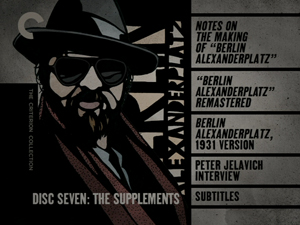
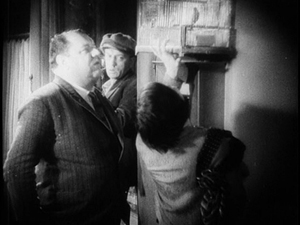
Lorenz also made a documentary for DVD 7 about the restoration process on Berlin Alexanderplatz. The thirty-five minute feature shows the extensive work that was done to take a degraded 16 mm negative and make new digital and 35 mm versions of it. Xaver Schwarzenberger is interviewed at length.
A vintage forty-five minute film Notes on the Making of "Berlin Alexanderplatz" (1980) is an insider's look at the making of the big series, and it is comprised exclusively of footage from on-set. Fassbinder is seen at work, directing his actors and solving problems with his crew. This piece also sheds some light on the epilogue episode.
A surprise bonus is the 1931 film version of Berlin Alexanderplatz, directed by Phil Jutzi and co-written by Alfred Döblin. It's neat to be able to compare and contrast what a shorter running time (just under ninety minutes) and the social mores and technology meant for the final product. To go with this, we get a twenty-four minute interview with author Peter Jelavich, who literally wrote the book on the history of the story. This video sitdown gives us some insight in the various forms of the story, from novel to radio to its film adaptations, and how it reflects the history of Berlin itself.
The 1931 film is interesting for its rather different tone. Biberkopf is played by Heinrich George, a leading German star of the time who gives the character more of a W.C. Fields posture than playing him as an imposing figure. He's far more bumbling and comical, subject to open ridicule and a concentrated effort to corrupt him. This version is not as cleaned up as the main feature, but the picture and sound are passable. The quality is akin to a VHS or cable TV print.
The packaging of the Berlin Alexanderplatz - Criterion Collection is a well-constructed foldable box. It has four plastic trays on the inside, three of them designed to hold two DVDs at staggered heights. The plastic for these trays seem extra thick in comparison to other sets. All the leaves of the booklet are decorated with art and quotes from the film, achieving a symmetry of design through the whole box and the outer slipcase that it slides into. A rather thick squarebound book, 72 pages in length, is also included, with essays by director Tom Tykwer (Run, Lola, Run) and author Thomas Steinfeld, an interview with Xaver Schwarzenberger, and Rainer Werner Fassbinder's writings on the Alfred Döblin novel. This book is also generously illustrated with color photographs.
FINAL THOUGHTS:
Highly Recommended. Rainer Werner Fassbinder's Berlin Alexanderplatz is a delectable delight, a sumptuous and rich feast from a director who dares you to eat the whole thing while making each course more challenging than the next. Adapting the 1929 novel by Alfred Döblin, this 1980 television series, told in thirteen episodes plus a double-length, mind-bending epilogue, chronicles the undulating fortunes of Franz Biberkopf (Günter Lamprecht). A one-time pimp and murderer, Franz has served his sentence for his crimes, but will soon find that rejoining life on the outside is far more difficult and possibly more confining than incarceration. Through various relationships with women, betrayals by friends, and the constant presence of temptation, Franz must traverse a quasi-religious, existential minefield that is very often the product of his own naïve design. Fully restored for its first-ever DVD release, the Berlin Alexanderplatz - Criterion Collection makes full use of modern technology and the DVD format to present film fans with a good-looking collection complete with illuminating extra features. This should be near the top of everyone's holiday wish list.
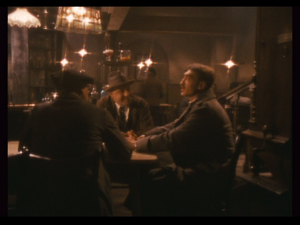
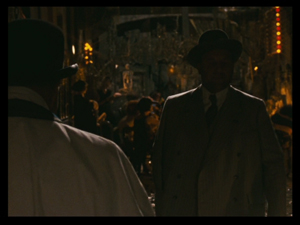
Jamie S. Rich is a novelist and comic book writer. He is best known for his collaborations with Joelle Jones, including the hardboiled crime comic book You Have Killed Me, the challenging romance 12 Reasons Why I Love Her, and the 2007 prose novel Have You Seen the Horizon Lately?, for which Jones did the cover. All three were published by Oni Press. His most recent projects include the futuristic romance A Boy and a Girl with Natalie Nourigat; Archer Coe and the Thousand Natural Shocks, a loopy crime tale drawn by Dan Christensen; and the horror miniseries Madame Frankenstein, a collaboration with Megan Levens. Follow Rich's blog at Confessions123.com.
|
| Popular Reviews |
| Sponsored Links |
|
|
| Sponsored Links |
|
|
| Release List | Reviews | Shop | Newsletter | Forum | DVD Giveaways | Blu-Ray | Advertise |
|
Copyright 2024 DVDTalk.com All Rights Reserved. Legal Info, Privacy Policy, Terms of Use,
Manage Preferences,
Your Privacy Choices | |||||||












